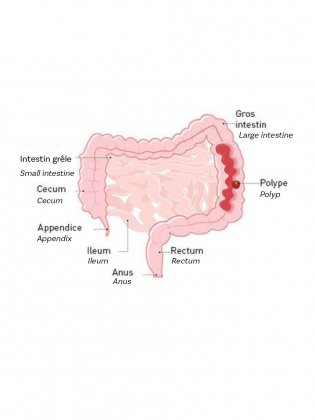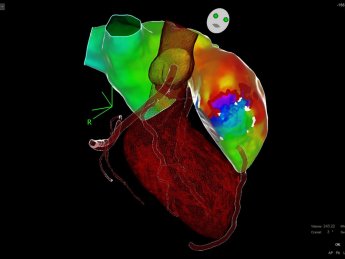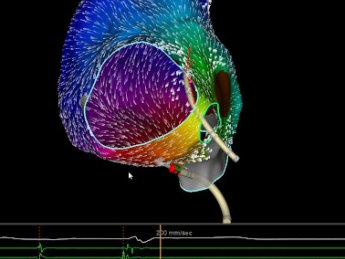Colon polyps
Types, risk factors and treatments
What should I know about the colon?
The colon is located in the abdomen, between the small intestine and the rectum. It averages 150 cm (5 feet) in length and is divided into four segments: ascending (right), transverse, descending (left) and sigmoid. The lining of the colon is made up of four overlapping layers: the mucosa (innermost layer), submucosa, muscularis, and serosa.
What are the different types of polyps?
- Hyperplastic polyps develop when cells in the colon’s mucosa grow too quickly. The risk of this type of polyp becoming cancerous is low, unless the polyps are too numerous or too large.
- Adenomatous polyps (adenomas) are characterized by the growth of new gland cells. They are the most common type of polyp and may become cancerous if left untreated.
- Hamartomatous polyps are characterized by the excessive growth of normal cells which disrupt the structure of the mucosa.
- Inflammatory polyps, which appear as raised areas of tissue, are common in persons with an inflammatory bowel disease.

What are the symptoms of polyps?
Most polyps are asymptomatic. The most frequent symptoms are blood in the stool and anemia. Larger polyps can cause cramps, abdominal pain or obstruction of the intestinal lumen.
In rare cases, large adenomas can lead to watery diarrhea and, consequently, lower levels of potassium in the blood.
What are the risk factors for colon polyps?
The growth of polyps may be linked to various risk factors:
- Age: risk increases with age
- Personal or family history of polyps
- Diet low in fiber
- Use of tobacco or alcohol
- Certain genetic diseases
- Acromegaly: a disease in which the body produces too much growth hormone
How are polyps diagnosed?
Polyps can be detected through a screening exam systematically offered in France to people 50 and over:
- Fecal occult blood test (FOBT) used to check stool samples for the presence of blood. If the result is positive, the patient must undergo a colonoscopy.
- Colonoscopy: a long, flexible tube with a camera at one end is used to view the mucosa of the colon to locate and then remove any polyps detected. The American Hospital of Paris uses new-generation colonoscopes featuring virtual chromoendoscopy and artificial intelligence. These instruments can automatically detect polyps during a colonoscopy, differentiating them in real time to determine if they are precancerous before analyzing them.
Polyps can generally be detected immediately during a colonoscopy performed as part of regular medical surveillance, because of a personal or family history of polyps or colorectal cancer, or when symptoms develop.
How to prepare for a colonoscopy
What are the treatment options for colon polyps?
Most polyps can be removed during the colonoscopy procedure with a wire loop or biopsy forceps. This procedure is called a polypectomy or mucosectomy. Some polyps are too large or present a superficial risk of cancer. In this case, a new removal technique known as submucosal dissection may be necessary. This innovative technique is used at the American Hospital of Paris and allows the entire polyp to be removed in one piece, regardless of its size, thus enabling more accurate analysis to determine whether an invasive form of cancer is present.
If the polyp is cancerous, the need for additional surgical treatment is determined based on the risk of the cancer spreading. This risk is determined by a meticulous microscopic examination of the polyp.
Key figures
Polyps occur in 30 to 50 percent of adults in industrialized countries.
Adenomatous polyps, or adenomas, are precancerous lesions representing approximately 70 to 75 percent of all polyps.
The removal of polyps during a colonoscopy significantly reduces the risk of colorectal cancer and eliminates the need for surgery.
Consult our gastroenterologists
Learn more

